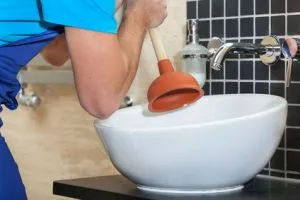A clogged drain is practically inevitable at some point, and while chemical drain cleaners may be quite effective in removing those challenging clogs that are hard to get to, they are also known for their harmful effects on humans and the environment.
The main ingredient in most drain cleaners is either sulphuric acid or sodium hydroxide, which can cause serious injury when coming into contact with skin or when ingested, in addition to harming the environment if they are improperly stored or used too often.
If these chemicals get onto your skin, they can burn, and if some of the solution happens to splash into your eyes, it can even blind. Mixing it with other chemicals, such as something else that’s been poured down the drain, can cause an explosive reaction, possibly harming you and anyone else who happens to be nearby.
If these poison are swallowed, they cause damage to the esophagus and stomach for several weeks afterwards – and death may occur as long as a month after the incident. The disposal of solvent-based cleaners can contaminate drinking water and potentially damage septic systems, too.
Why risk the dangers when there are effective, non-toxic and far less corrosive methods for clearing pipes? A do-it-yourself solution works best when using it routinely before a clog occurs.
Keep in mind that when using your DIY drain cleaner it will take longer than those toxic commercial cleaners, so you might have to repeat your efforts a few times before it works – many take up to an hour, but it is well worth the wait.
Baking soda and apple cider vinegar
Once again it’s apple cider vinegar to the rescue. Mixing one cup of apple cider vinegar with a cup of baking soda and pouring it into the drain will cause it to bubble and fizz. Wait for about 30 minutes and then run plenty of hot water into the drain. Repeat until the drain is no longer clogged. Doing this on a regular basis is also a great way to prevent clogs from happening in the first place.
Baking soda and lemon juice
If you don’t want to put up with the smell of vinegar, you can use lemon juice instead. The aroma is much nicer and it works just as well. Follow the same method for baking soda/vinegar using one cup of lemon juice to replace the vinegar. Be sure to run lots of hot water after letting the mixer foam up, and let it sit in the drain for 30 minutes.
Boiling water
Sometimes all it takes is pouring boiling water into the drain to clear a clog, especially in a kitchen sink. These types of clogs often develop due to fats and oils that get cold in the pipe and solidify, so boiling water will easily eradicate this problem.

-The Alternative Daily
